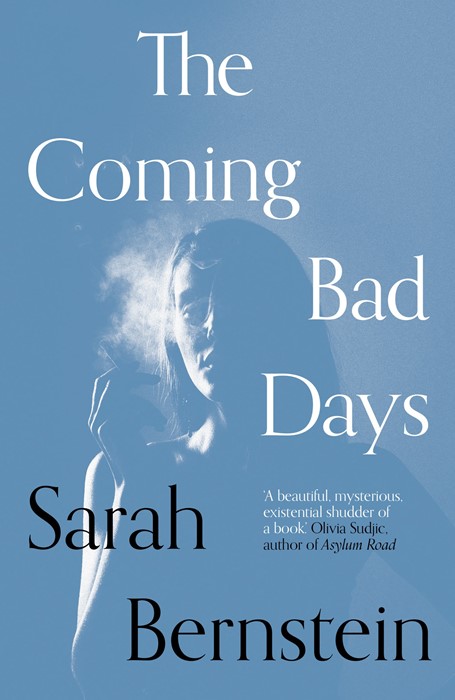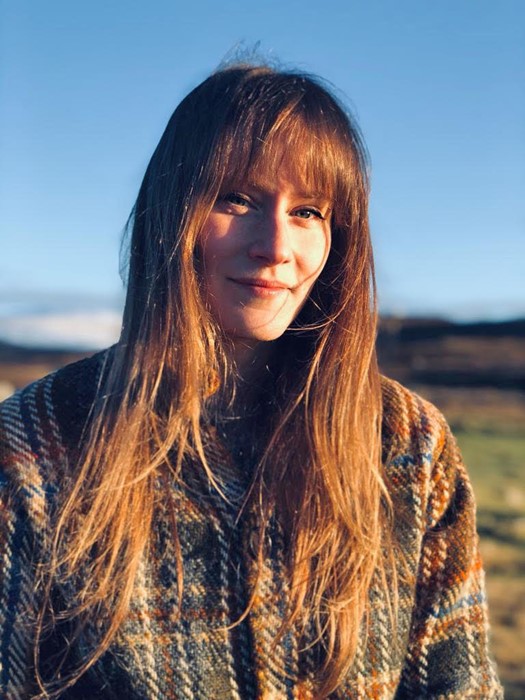Sarah Bernstein discusses her debut novel, The Coming Bad Days – a mysterious and timely story of dread, isolation and feminine vulnerability
Sarah Bernstein’s debut novel, The Coming Bad Days (Daunt Books), is an enigma. “One question I struggle with most is what is the book about,” the Montreal-born author admits. “I was trying to create a sense of atmosphere, so it’s sort of hard to describe in one sentence.” But that atmosphere can be defined, at least in part, by its dread. Simmering under the surface of the book is a feeling of apprehension; a fear that something bad is about to happen, that a boiling point is about to be reached. It’s a sensation many of us know well, particularly after the events of the last year.
The Coming Bad Days follows the story of an unnamed female protagonist working at a university in an unnamed city. She is lonely and drifting, settling into a life of stagnant mediocrity and self-imposed exile. The weather around her is visibly deteriorating, and there are unexplained dangers facing the women in her town, implied by a mysterious local curfew and hints of sexual violence. The surrounding world is collapsing, in other words – but no one is directly registering it.
Like her protagonist, Bernstein currently works for a university – Edinburgh University – where she teaches literature and creative writing. The Coming Bad Days is her first novel, and while it was written many months before the dread-inducing reality of the pandemic, she acknowledges the uncanny timing. Here, she talks more about the novel‘s bubbling black comedy, feminine vulnerability, and the strange, shakey fragility of modern life.

Dominique Sisley: The book takes us through a woman’s existential crisis. Is that a topic you’ve been thinking about a lot recently?
Sarah Bernstein: The main thing that I was trying to get across is the sense of both the personal and social crisis. So, how can someone experience a personal crisis when the world itself is in crisis, and there’s no stable background or reality? The world is constantly in flux. I also wanted to explore the idea of how selfish or ridiculous it can feel to be having an existential crisis in the midst of a global catastrophe.
DS: There is a sense of dread simmering through the book – there’s an unexplained curfew, and the protagonist keeps talking about how she feels like something bad is going to happen. You wrote this before the pandemic, right?
SB: I wrote this before Covid, so it’s an unlucky connection. But I think even before that, we were seeing all of the ways in which the mechanisms of our political systems were being laid bare. They’re not working, and we finally see that they’re not working. A lot of people have known that for a long time, but I think it’s being pointed out in a way that even people who don’t want to be paying attention are being made to pay attention.
DS: Do you think that sense of dread and apprehension still defines our current moment, even post-pandemic? What will it take for that feeling to stop?
SB: Yeah. I mean, you hope that there will be an eventual break. But I think what’s scary is that it might never come to an end – we might just keep edging towards disaster forever until it’s too late to make a decision. And then we’re just screwed. I’m particularly talking about the climate crisis, where it does seem like our leaders are hedging their bets and seeing how long they can hold off because nobody wants to be the one to make the expensive decision, or take responsibility. But we are reaching a point of no return.
In the novel, the protagonist wants something to happen, but she doesn’t know what or how to make it happen. That sense of dread is particularly experienced by women. We all exist in a world where disaster is the air we breathe, but it is inflected in a particular way for women, and particularly for this protagonist, which has to do with the strength of sexual violence and the threat of gendered violence. It’s a funny book.
“One thing that I was thinking about is the importance of nurturing the relationships that exist between people. We don’t live in this world alone. We are responsible for it” – Sarah Bernstein
DS: Would you market the book as a comedy, then?
SB: Maybe not quite that. But I was interested in the sense of the absurd, and the way that language is just so insufficient to the task of explaining and describing the monumental situation that we find ourselves in.
DS: The relationship between the protagonist and her friend Clara is fraught, intimate, competitive, and a central theme of the story. What does it represent to you?
SB: There’s something about the way these characters are so comfortable sitting with difficulty, to an almost pathological extent. I think obviously it’s crucial to sit with difficulty; we have to sit with discomfort in our lives. But these two people have no other mode of being. For the protagonist, particularly, difficulty is the only mode she knows. She doesn’t understand how to experience pleasure or what a joyful relationship might look like.
DS: Why is she so lonely? How did she get to that point?
SB: I think there’s sometimes a tendency to fetishise loneliness, solitude and being alone, and I think the protagonist does do that to a certain extent. And that is one of the things that proves harmful to her, because she thinks that she doesn’t need other people, but she does. And then when she tries to make her first attachment (with Clara), she doesn’t really know how to do that. She doesn’t really have the emotional structures to understand how she might go about that, but [as the book goes on] she starts to understand herself in relation to other people.
DS: The vulnerability, the loneliness, the dread – it all feels very gendered in the book. They feel distinctly feminine. These feelings are coming back to the surface of mainstream discussion this year, particularly after the Sarah Everard case. Have you always felt passionate about them?
SB: It’s always something that I’ve been aware of in terms of the way I move through the world and the way I move through cities. I resent the idea that I feel unsafe, and I resent the idea that I’ve been followed. It makes me angry that it would happen to anybody, and it was devastating to see happen again. We’re told we’re in a post-feminist world and we don’t need to worry about those things anymore, but I think I think a lot of women still do. We have all these safety mechanisms that are programmed into us, like walking home with our keys in our hands. We also know that institutions don’t protect women. When I was a bit younger, I volunteered on a sexual assault crisis line, and as part of that training, they brought in the Crown Prosecutor of the Province to talk about what it would be like if a woman were to decide to try to press charges. The prosecutor just basically told us not to bother, because it’s so hard to get justice in that way. It was shocking to me at the time. We have to believe that there can be some way outside of the criminal justice system for people to heal; there has to be a different way for people to think about recovery.
DS: Did you feel a sense of catharsis or clarity about your own life once you’d finished writing this book?
SB: One thing that I was thinking about is the importance of nurturing the relationships that exist between people. We don’t live in this world alone. We are responsible for it, and for the social situations in which we find ourselves. I don't mean to say that we have the possibility to change the world, because I think I’m far more pessimistic than that. But I think, nevertheless, that we have to be attentive to one another. That can be really hard, but it’s what’s required.
The Coming Bad Days by Sarah Bernstein, published by Daunt Books, is out now.
